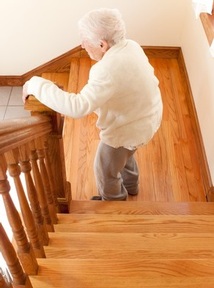NICE: Let them take risks, don't 'give up' on those needing home care
People living at home should be allowed to take risks and care staff should not ‘give up' on those 'trying to be independent after a hospital discharge or in their own homes', NICE warns.

In its first ever guideline on intermediate care, NICE (National Institute for Health and Care Excellence) is advising health and social care staff how they should help people to continue doing activities such as climbing stairs, dressing themselves or cooking, after an illness or hospital stay.
NICE says care staff should talk openly about risk-taking behaviour. When discussing risks, they are advised to do so 'in a positive manner so as not to discourage people’. The aim is to get people to confidently get on with tasks they would like to do themselves, while any risks are discussed and managed safely.
Dee Christie, who chaired the guideline committee, has 35 years' experience running intermediate care services. Ms Christie said: “There is a lot we can do to support people after illness, or when things get more difficult at home so no one should give up on their independence.
“If we focus on people's strengths and help them realise their potential they can often regain their independence. Intermediate care can specifically design rehabilitation programmes that support people's recovery whether they are at home or in hospital."
Staff shouldn’t automatically intervene
The NICE guideline advises staff to work with people to find out the best way to carry out activities safely, so they can observe and guide them as they manage the task and not automatically intervene. The guideline covers how to assess intermediate care needs, including setting goals with the person so that they can overcome the problems they are experiencing.
NICE describes intermediate care as a vital, free, short-term service which helps speed up discharge and reduces hospital admissions. Intermediate care can be provided as part of NHS services in bed-based units attached to hospitals. It can also be delivered in care homes or the person’s own home, funded by local authority social care or NHS services.
Ms Christie added: “Providing high-quality intermediate care has the potential to ease the pressures facing the NHS and social care sector.
"Better support for people and their families to recover fully and regain independence will mean they can quickly return home and stay out of hospital or avoid hospital admission altogether. This will free up hospital beds and reduce reliance on community services."
Adopt guideline before ‘difficult’ winter arrives
Julia Scott, the chief executive of the Royal College of Occupational Therapists said: “With NHS leaders being warned that this winter could be the most difficult for a generation, it is imperative that they take rapid action to implement NICE’s recommendations in full.
“Too often, health and care services only deal with a set of symptoms or just the care needs that demand immediate attention, rather than seeing the whole person and focusing the support on what matters to that person.
NICE’s recommendations build on our evidence that shows that intermediate services which take a holistic ‘whole person’ approach deliver better care for service users that is more cost-effective for taxpayers.”
NICE’s guideline on ‘Intermediate Care’, published on 22 September, can be read on its website: www.nice.org.uk/guidance/NG74
Latest News Analysis
 04-Sep-19
Extra £1.5 billion announced for social care in Chancellor's Spending Review
04-Sep-19
Extra £1.5 billion announced for social care in Chancellor's Spending Review
 17-Jul-19
Flexible Working Bill for all jobs gets MPs approval - delighting parents, disabled and carers
17-Jul-19
Flexible Working Bill for all jobs gets MPs approval - delighting parents, disabled and carers
 18-Jun-19
Overnight care workers forced to sleep in offices and told 'bring your own bedding'
18-Jun-19
Overnight care workers forced to sleep in offices and told 'bring your own bedding'
 11-Jun-19
PM candidates on social care: Rory Stewart calls fixing care an 'unfinished revolution'
11-Jun-19
PM candidates on social care: Rory Stewart calls fixing care an 'unfinished revolution'
 05-Mar-19
Amber Rudd announces scrapping of controversial PIP payment review for pensioners
05-Mar-19
Amber Rudd announces scrapping of controversial PIP payment review for pensioners